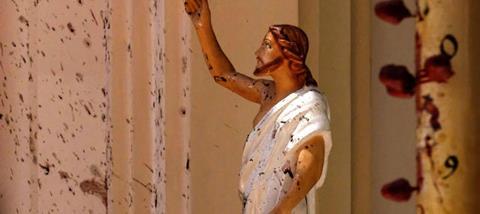
On Easter Sunday three Christian churches in Sri Lanka were bombed, along with three luxury hotels in Colombo, and more than 250 people were killed and at least 500 injured. This attack by a group linked to Islamic State was not an isolated incident. Foreign Office officials say that globally at least 215 million Christians faced discrimination and violence in the last year and an average of 250 are killed every month.
In some countries religious persecution is virtually public policy. Asia Bibi spent eight years on death row, convicted of blasphemy on the basis of fabricated evidence. She was acquitted by Pakistan’s Supreme Court only for riots to break out protesting against the court’s decision. The Supreme Court’s judgement was reviewed and upheld but Ms Bibi is still under protective security, lest extremists attempt to assassinate her.
Open Doors say 245 million Christians suffer persecution globally and at least 4000 were martyred last year. The American Pew Research Centre said that Christians faced persecution from governments in 148 countries in 2016. China is one the worst offenders despite there being large numbers of Christians and well attended churches. In the Middle East, the birthplace of Christianity, 20% of the population were Christians a century ago but today that figure has shrunk to 5%. Nor are Christians the only victims. The persecution of the Rohingya people in Myanmar is another example of State led persecution of a religious minority, in this case Muslims.
The Foreign Secretary, Jeremy Hunt, who describes himself as a man of faith, has set up a review, to be led by the Bishop of Truro, into how the Foreign Office handles religious persecution. Hunt accepts that the Government must do more to champion religious freedom internationally. He has suggested “the persecution of Christians is a telling early warning sign of the persecution of every minority”.
But fine words won’t stop religious discrimination and persecution. Resolute action is needed to make freedom of belief real in the world today. Perhaps the UN should be giving a lead on this and our representatives should make it a top priority to publicise evidence of religious persecution and shaming Governments practising or tolerating it, with the threat of suspension from membership of the UN if they don’t act to prevent and punish discrimination and persecution.
In this country, the Government and all political parties should be pressed to ensure that our domestic and foreign policy makes freedom of belief a priority in public policy. Officials should be educated to ensure that they actively practice this priority. They should also be encouraged to work closely with groups such as Christian Solidarity Worldwide and Open Doors so that they are well informed about what is actually happening across the globe.
Domestically, schools should be encouraged to educate children to understand the importance of freedom of belief. Churches and other faith communities should be making prayer for those suffering persecution a priority. Might even business and industry be encouraged not to trade with suppliers in countries that don’t respect freedom of belief and persecute religious minorities?
Who knows, if we do nothing, may we or our children face discrimination or persecution in the future. At the heart of the Christian faith is the dual duty to love God and our neighbour. Who is my neighbour? Jesus’ answer was the parable of the Good Samaritan, the one who had mercy. (Luke 10:25-37) And Jesus says, “Go and do likewise”.





























